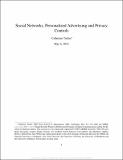Social Networks, Personalized Advertising, and Privacy Controls
Author(s)
Tucker, Catherine Elizabeth
DownloadTucker_Social networks.pdf (390.6Kb)
OPEN_ACCESS_POLICY
Open Access Policy
Creative Commons Attribution-Noncommercial-Share Alike
Terms of use
Metadata
Show full item recordAbstract
This article investigates how Internet users' perceptions of control over their personal information affect how likely they are to click on online advertising on a social networking website. The analysis uses data from a randomized field experiment that examined the effectiveness of personalizing ad text with user-posted personal information relative to generic text. The website gave users more control over their personally identifiable information in the middle of the field test. However, the website did not change how advertisers used data to target and personalize ads. Before the policy change, personalized ads did not perform particularly well. However, after this enhancement of perceived control over privacy, users were nearly twice as likely to click on personalized ads. Ads that targeted but did not use personalized text remained unchanged in effectiveness. The increase in effectiveness was larger for ads that used more unique private information to personalize their message and for target groups that were more likely to use opt-out privacy settings.
Date issued
2014-10Department
Sloan School of ManagementJournal
Journal of Marketing Research
Publisher
American Marketing Association
Citation
Tucker, Catherine E. “Social Networks, Personalized Advertising, and Privacy Controls.” Journal of Marketing Research 51, no. 5 (October 2014): 546–562.
Version: Original manuscript
ISSN
0022-2437
1547-7193